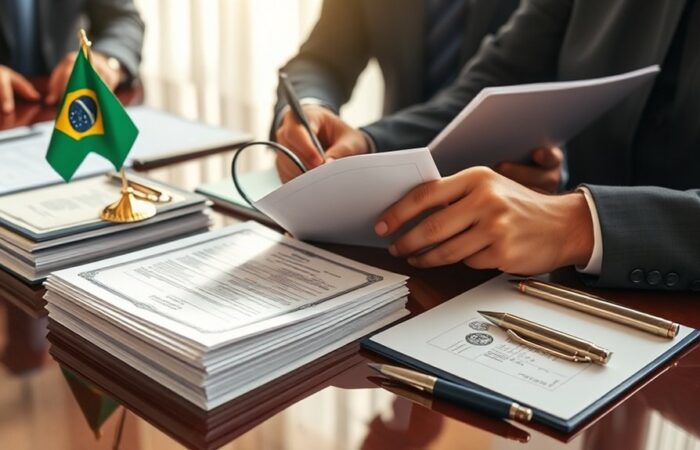When your visa application is at risk because police certificates or passports are delayed, it can feel like you’re running out of options fast. It’s easy to underestimate how quickly these hurdles put your plans in jeopardy. That’s where Vieira Braga Advogados comes in, offering strategies you might not have considered. If you’re wondering what steps you can actually take when time is tight and approvals hang in the balance, there’s more you need to know.
Understanding the Impact of Document Delays on Visa Applications
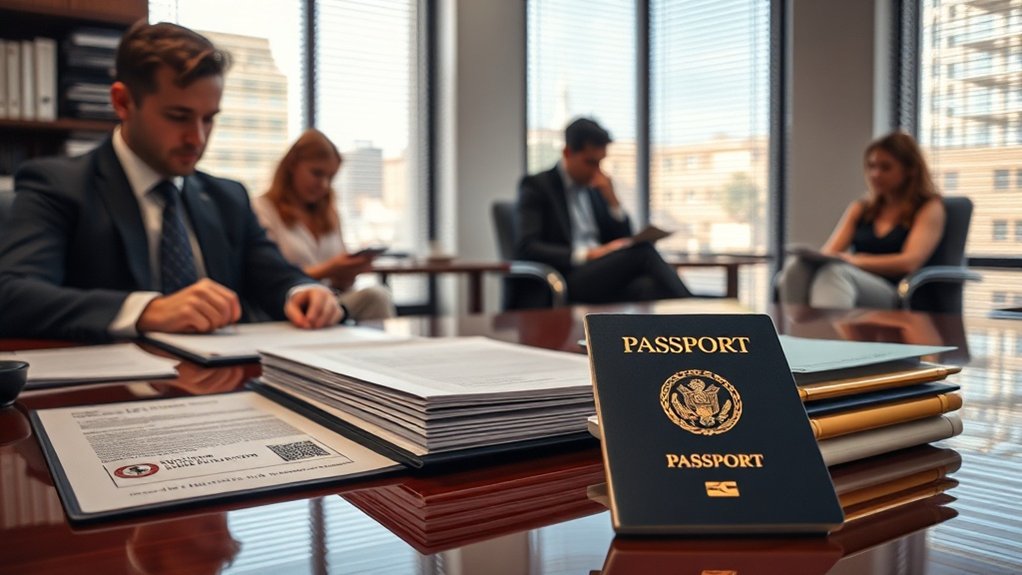
When you’re waiting on essential documents like police certificates or passports, even a small delay can disrupt your visa application process. You may think you have everything under control, but a late document can quickly cause stress and uncertainty. If you’re missing critical paperwork, you simply can’t submit a complete visa application. That puts your plans on hold, whether you’re seeking to work, study, or join family in another country.
Delays can also affect your ability to secure appointments or move forward with other requirements. If you wait too long, you risk having to restart some steps or gather new supporting evidence, since some documents have expiration dates or validity periods. Even if you’re organized, matters beyond your control—like processing backlogs—can throw off your schedule. To avoid these setbacks, it’s vital to understand how every required document fits into the process and how delays may impact your overall timeline. Seeking professional guidance can also help increase your chances of a successful visa outcome, especially when facing unexpected document delays.
Key Deadlines and Risks in the Brazilian Consular Process
Although the Brazilian consular process offers clear instructions, strict deadlines can quickly complicate your visa application if you’re missing documents like police certificates or passports. You need to stay alert to all timeframes, since late submissions can result in serious setbacks. The consulate expects every document to be ready and submitted on time. If you don’t meet the deadlines, your application could be rejected, forcing you to start the entire process again. That means more time, money, and stress.
Here are three key deadlines and risks you should keep in mind:
- Submission Deadline – Missing this date leads directly to a visa refusal or the need to restart your application.
- Response to Requests – If consular officers ask for more information, your window to reply is extremely limited.
- Expiry of Documents – Submitting expired police certificates or passports can invalidate your entire application before officials even review it.
Stay vigilant to avoid these pitfalls. When facing document delays, consulting a qualified immigration lawyer can significantly reduce your risk of rejection and provide you with practical solutions to navigate Brazilian consular requirements.
Common Reasons for Police Certificate and Passport Delays
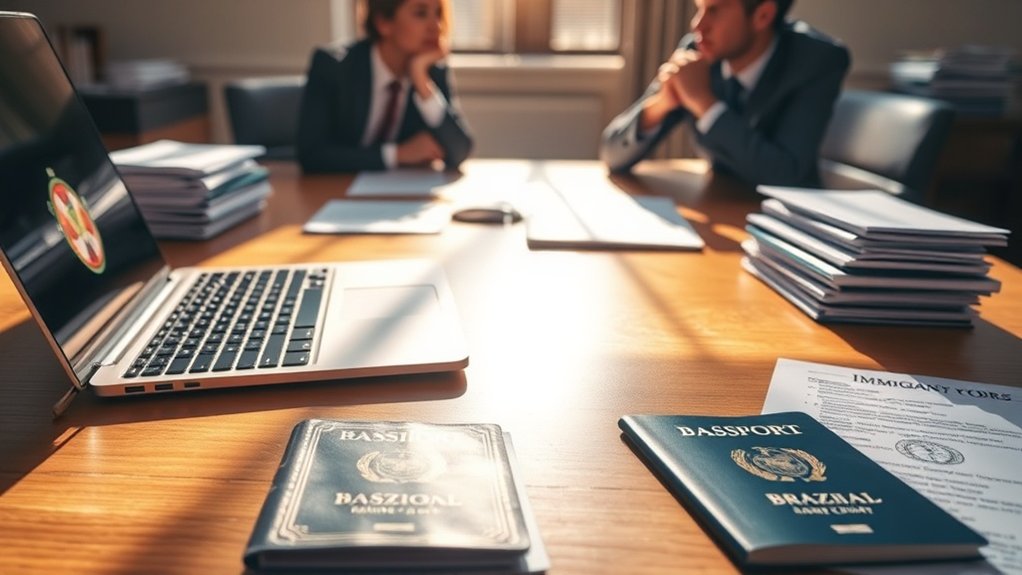
You might notice that delays often stem from administrative processing backlogs, documentation submission errors, or international mail disruptions. Each of these can slow your application unexpectedly. Let’s look at how these issues could impact your timeline. Additionally, being aware of the average consultation fees for immigration lawyers in Brazil can help you prepare financially for potential setbacks in your application process.
Administrative Processing Backlogs
Due to overwhelming demand and resource limitations, administrative processing backlogs often cause significant delays in obtaining police certificates and passports. When agencies receive more requests than they can handle, your application may sit in a queue for weeks or even months. It’s not just about volume—many offices also struggle with outdated technology and limited staff, making each step slower. If you’re encountering delays, it’s likely due to one or more of the following factors:
- High Application Volume: Government offices get overloaded during peak travel seasons or after policy changes.
- Inadequate Staffing: Many agencies don’t have enough trained personnel to process all requests efficiently.
- Outdated Systems: Legacy software or manual processes slow down verification and issuance times even further.
Having legal support from specialized immigration lawyers can help you manage these administrative delays by ensuring your application is complete, accurate, and submitted according to best practices.
Documentation Submission Errors
When applicants make mistakes or omit essential information during the submission process, police certificate and passport requests often get delayed. You might accidentally leave a field blank, provide an outdated address, or fail to include required supporting documents. Even a small typo in your name or date of birth can trigger additional verification steps, slowing everything down. Officials usually have to contact you for corrections, which leads to longer wait times.
To avoid these setbacks, double-check every form and attachment for accuracy. Review official checklists and instructions before submitting your application. Make sure your documents are translated and notarized if needed. By being thorough and attentive, you’ll minimize the risk of submission errors that could stall your request and require intervention from professionals like Vieira Braga Advogados. Experienced legal help can minimize these delays by ensuring detailed guidance on required documentation and thorough review before submission.
International Mail Disruptions
Even with flawless paperwork, external factors can hinder the timely arrival of police certificates and passports. International mail disruptions are a leading cause of these delays. You may do everything right on your end, but global events can still impact postal services. When goods and documents cross borders, unexpected issues often arise that slow down delivery.
Here are three common international mail disruptions you should watch for:
- Strikes or labor disputes – Postal workers might strike, halting mail processing for days or weeks.
- Customs backlogs – Increased security checks or staff shortages at customs can stall documents, even if they’re urgent.
- Transport interruptions – Weather events, flight cancellations, or geopolitical tensions can all disrupt standard mail routes.
Monitor your tracking and communicate delays promptly. If you’re facing such delays, consulting with an immigration lawyer can help you understand your legal compliance requirements and prepare alternative solutions.
Legal Steps to Take When Facing Documentation Issues
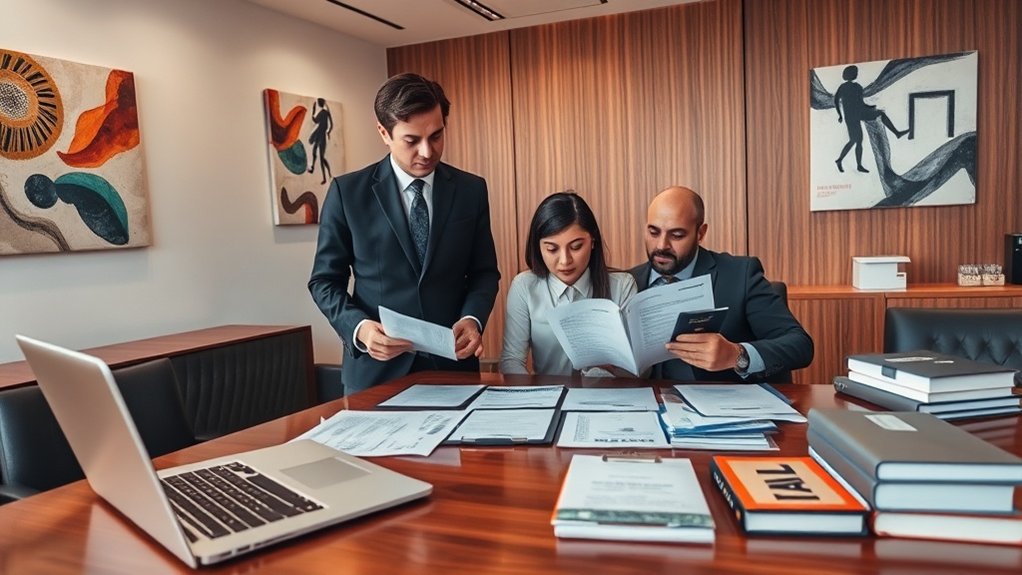
If you’re experiencing delays, make sure you promptly notify immigration authorities about your situation. Gather any supporting documentation that proves you’ve applied or taken necessary steps. You can also request extension letters to protect your status while you wait. Engaging an immigration lawyer with specialized knowledge can help you navigate these documentation challenges effectively and improve your chances of maintaining lawful status.
Notifying Immigration Authorities Promptly
Although navigating documentation delays can feel overwhelming, you must notify immigration authorities as soon as you realize there’s an issue with your police certificate or passport. Quick notification demonstrates responsibility and transparency, which is crucial when your immigration status is at stake. Don’t wait until the last minute—contact authorities right away, preferably in writing. This allows them to guide you on the best immediate steps and may prevent negative consequences, such as application refusals or status lapses. Here’s how you should proceed:
- Inform promptly: Email or call the relevant immigration office as soon as you detect a delay.
- Document your communication: Keep thorough records of all correspondence sent to and received from authorities.
- Follow their guidance: Respond promptly to any instructions or requests for further information.
Additionally, seeking help from an immigration lawyer can ensure your documentation requirements are properly organized and avoid common pitfalls that could affect your case.
Gathering Supporting Documentation
Once you’re aware of delays with your police certificate or passport, gather all relevant supporting documentation right away. Start by keeping official receipts and confirmation emails that show you’ve applied for your documents. Track any correspondence with police or passport authorities, including emails, online statuses, or letters confirming the application or outlining reasons for the delay. If you’ve tried contacting authorities for updates, save call logs, written replies, or case numbers. Collect proof of any completed background checks, even if the final certificate hasn’t arrived. Make sure all documents are in order, clearly legible, and in a format suitable for submission. Staying organized makes it easier to demonstrate your efforts and good faith if questions arise from immigration officials. Consulting an immigration lawyer can help you ensure compliance with immigration laws throughout the process and minimize the risk of problems with your application.
Requesting Extension Letters
When delays with police certificates or passports threaten your application deadlines, you should promptly request an extension letter from the relevant immigration authority. Acting quickly demonstrates your proactive approach and helps safeguard your application status. To request an extension, you’ll need to prepare a letter that clearly explains the reason for the delay and provides evidence of your efforts to obtain the necessary documents. Vieira Braga Advogados can guide you in drafting a compelling and compliant request. Follow these three steps for an effective extension request:
- Gather all proof of document requests and communication showing ongoing delays.
- Draft a concise extension letter stating your reasons and attach the supporting documentation.
- Submit your request through the official channel required by the immigration authority and track the outcome.
Early consultation with specialized legal assistance can help you reduce risks of errors during urgent extension requests, ensuring your case is presented as strongly as possible.
How Vieira Braga Advogados Assists With Extension Requests
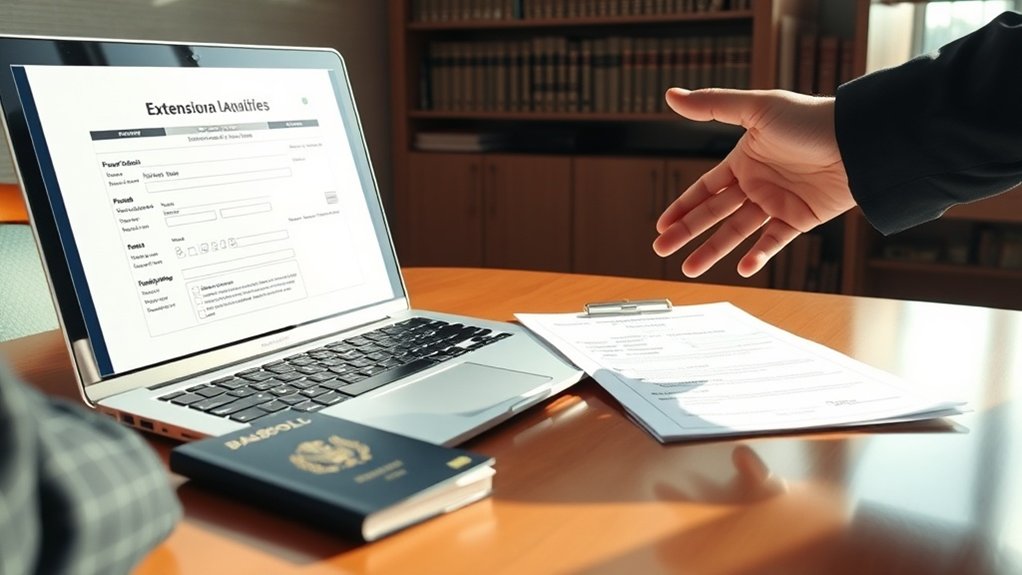
If you’ve encountered delays with obtaining police certificates or passports, Vieira Braga Advogados steps in to guide you through extension requests efficiently. They don’t just fill out forms—they personalize your case, explain your situation clearly, and ensure you meet every consulate’s requirements. Their experienced team reviews your circumstances, recommends the best approach, and handles all communications, so you don’t feel overwhelmed by the process.
Here’s how Vieira Braga Advogados supports you with extension requests:
| Step | What Vieira Braga Advogados Does |
|---|---|
| Case Review | Analyzes your specific delay circumstances |
| Documentation Drafting | Prepares persuasive explanation letters |
| Compliance Check | Ensures all format and deadline criteria |
| Submission Assistance | Handles filing and follows up with consulates |
Rely on their knowledge of legal processes, language, and requirements, which greatly improves your chances of securing the extension you need. By letting them manage your case, you save time, reduce stress, and avoid costly mistakes.
Required Evidence for Proving Delays to Consulates
Although consulates understand that delays can happen, they require clear and convincing evidence before granting any extension. You can’t rely on verbal explanations or vague statements. Instead, you need to provide official documents that prove exactly why your police certificate or passport hasn’t arrived as expected. Without solid evidence, consulates may reject your request for more time. To make your case stronger, always gather and submit the right documentation.
Here’s what you should include:
- Official Receipts or Confirmation Letters: Provide proof of your application for the police certificate or passport, including date-stamped receipts or online confirmation emails.
- Correspondence With Authorities: Show any emails, letters, or messages you’ve received from police departments or passport agencies detailing the status or reasons for the delay.
- Public Notices or Announcements: Attach official statements or news releases about processing backlogs, strikes, or system outages that affect document issuance times.
These documents clearly establish genuine delays.
Crafting a Strong Justification Letter for Visa Extensions

When you write a justification letter for a visa extension, focus on including all essential components, such as clear timelines and official correspondence. You need to show that delays in getting your police certificate or passport were genuine and out of your control. Present documents and facts logically so consulates understand your situation right away.
Essential Components to Include
To craft a strong justification letter for a visa extension, you need to present essential information clearly and convincingly. A solid letter isn’t just about explaining your delay—it’s about showing you’re proactive, organized, and honest with immigration authorities. Focus on providing the necessary facts and supporting documents to make your case stand out. Make sure each key component is addressed thoroughly and professionally. Here are three components you must include:
- Personal Identification Details: Clearly state your full name, date of birth, passport number, and current visa details.
- Reason for Extension: Describe why you’re requesting a visa extension, focusing on the delayed police certificate or passport.
- Supporting Documentation: Attach official evidence, such as receipts or confirmation letters, demonstrating your attempts to resolve the issue.
Since immigration authorities place high importance on timely document submission, it’s crucial to clearly prove that your delay was truly beyond your control. You should present objective evidence, such as official letters, dated emails, or government-issued notices, that directly confirm the reason for your delay. Don’t rely on vague explanations; instead, include specifics—like agency contact details, reference numbers, or appointment dates—to show you acted diligently. Clearly link the delay to events outside your influence.
Emphasize these key elements:
| Required Evidence | What It Demonstrates | Examples |
|---|---|---|
| Official Notices | Delay caused by issuing agency | Government backlog notice |
| Email Correspondence | You requested documents promptly | Email to/request from consulate |
| Appointment Proof | Efforts to resolve issue | Appointment confirmation |
This approach builds trust and credibility, essential for extension approval.
Liaising With Authorities to Expedite Pending Documents
Although dealing with bureaucratic delays can be frustrating, our team actively engages with authorities to fast-track the processing of your police certificates or passports. We know your time is valuable, so we don’t just wait for updates—we take initiative and communicate directly with the relevant agencies. You can rely on us to navigate government procedures and ensure your requests are prioritized wherever possible.
Here’s how we work to expedite your pending documents:
- Direct Communication: We establish contact with the exact departments handling your application, clarifying status and requesting updates.
- Submission of Supporting Evidence: When needed, we promptly provide documentation that shows the urgency or necessity of expediting your application, such as proof of deadlines or compelling circumstances.
- Persistent Follow-ups: We monitor your case and make regular follow-up calls and written inquiries, so your request stays on the authorities’ radar until you receive your documents.
You’ll never feel alone in the process.
Preventing Application Rejection Due to Missing Paperwork
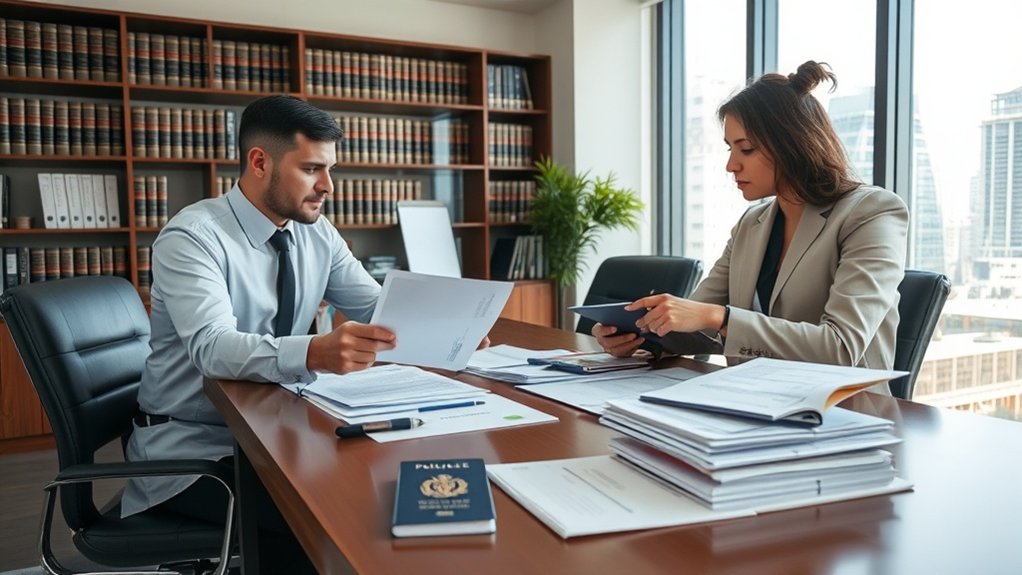
Because missing documents can lead to costly delays or outright rejection of your application, we take steps to ensure every requirement is met before submission. You should begin by carefully reviewing the most up-to-date checklist provided by the relevant authorities. Double-check all document requirements, including translations or notarizations if necessary. If you’re waiting for a police certificate or a renewed passport, gather proof showing you’ve applied and are awaiting the official document.
We recommend including a detailed cover letter with your application, explaining why specific paperwork is missing and attaching all supporting evidence of your efforts to obtain it. This proactive communication shows that you’re diligent and transparent, potentially reducing the risk of refusal. Don’t forget to retain all application receipts and relevant correspondence. By staying organized and thorough, you’ll minimize the risk of your application being rejected due to paperwork issues while navigating these unavoidable delays.
Long-Term Strategies for Managing Visa Application Timelines
When you’re planning an international move or career opportunity, careful management of visa application timelines becomes essential for success. Long-term strategies help you anticipate potential setbacks and avoid stressful surprises. By taking a proactive approach, you can minimize delays, even when police certificates or passports take longer to obtain.
Here’s how you can streamline the process and stay ahead:
- Create a timeline: Map out each visa requirement, including estimated processing times, and set reminders for every key deadline.
- Monitor document renewal dates: Regularly check when important documents like passports and police certificates expire or need to be requested. Apply for renewals well in advance to avoid last-minute issues.
- Maintain open communication: Establish a reliable contact with your legal advisor, like Vieira Braga Advogados, to get timely updates and advice if timing issues arise.
With these strategies, you’ll confidently navigate complex visa processes and keep your relocation plans on track.
Frequently Asked Questions
What Are the Fees for Hiring Vieira Braga Advogados for Extension Requests?
You’ll find that Vieira Braga Advogados typically charges a flat fee or an hourly rate for handling extension requests, and rates can vary depending on the complexity of your case. Expect to pay anywhere from €250 to €750 for standard services, but you’ll want to request a personalized quote. Don’t forget to ask about additional costs, such as translations or government filing fees, so you’re not surprised by extra charges during your process.
How Long Does Vieira Braga Advogados Take to Respond to Client Inquiries?
You can usually expect Vieira Braga Advogados to respond to your inquiries within one to two business days. They prioritize clear communication, so if your case is urgent or time-sensitive, you should mention it in your message for a faster reply. They use email and phone as their main channels, and you’ll notice they’re attentive to your concerns. If you don’t hear back, a follow-up is encouraged and generally effective.
Is Vieira Braga Advogados Experienced With Consulates Outside Brazil?
Yes, you can rely on Vieira Braga Advogados for experience with consulates outside Brazil. They’ve worked on a range of international immigration and legal matters, which often require close coordination with foreign consulates. If you’re navigating visa extensions, notarial processes, or document legalization abroad, you’ll benefit from their knowledge and established protocols. You’ll find their track record makes your interactions with overseas consular offices smoother and more efficient.
Can Vieira Braga Advogados Help With Appeals After a Visa Denial?
Yes, you can get help from Vieira Braga Advogados if you want to appeal a visa denial. They’ll guide you through the entire appeals process, helping you understand why your visa was denied and preparing all the necessary documents and arguments. Their legal team ensures you meet important deadlines and follow each step correctly. With their experience in visa cases, you’ll boost your chances of a successful outcome on your appeal.
Does Vieira Braga Advogados Offer Services in Languages Other Than Portuguese?
Yes, you’ll find Vieira Braga Advogados offers services in languages besides Portuguese. If you’re more comfortable communicating in English—or sometimes Spanish—you can request consultations and documentation support in those languages. This helps ensure you fully understand the legal process and don’t miss out on crucial details. You should mention your language preference when booking, so they can assign someone suited to your needs and make everything as clear as possible for you.
Conclusion
When document delays threaten your visa application, you don’t have to face the stress alone. With Vieira Braga Advogados, you’ll get expert guidance every step of the way—from drafting strong extension requests to managing communication with consulates. By acting quickly and relying on their experience, you’ll boost your chances of timely approval and avoid unnecessary setbacks. Trust their team to protect your interests and help you navigate the challenges of police certificate or passport delays.

